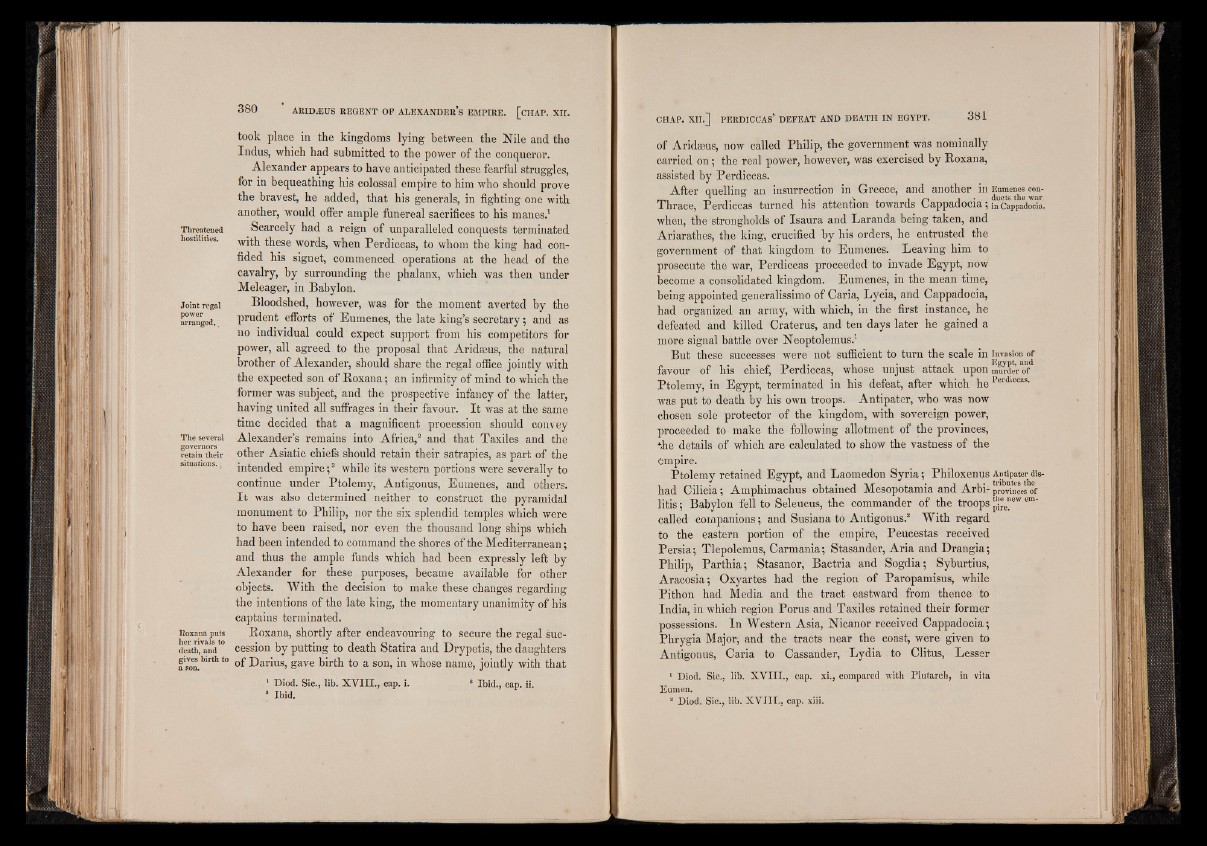
Threatened
hostilities.
Joint regal
power
arranged. ‘
The several
governors
retain their
situations.;
Roxana puts
her rivals to
death, and
gives birth to
a son.
took place in the kingdoms lying between the Nile and the
Indus, which had submitted to the power of the conqueror.
Alexander appears to have anticipated these fearful struggles,
for in bequeathing his colossal empire to him who should prove
the bravest, he added, that his generals, in fighting one with
another, would offer ample funereal sacrifices to his manes.1
Scarcely had a reign of unparalleled conquests terminated
with these words, when Perdiccas, to whom the king had confided
his signet, commenced operations at the head of the
cavalry, by surrounding the phalanx, which was then under
Meleager, in Babylon.
Bloodshed, however, was for the moment averted by the
prudent efforts of Eumenes, the late king’s secretary; and as
no individual could expect support from his competitors for
power, all agreed to the proposal that Aridseus, the natural
brother of Alexander, should share the regal office jointly with
the expected son of Roxana; an infirmity of mind to which the
former was subject, and the prospective infancy of the latter,
having united all suffrages in their favour. It was at the same
time decided that a magnificent procession should convey
Alexander’s remains into Africa,2 and that Taxiles and the
other Asiatic chiefs should retain their satrapies, as part of the
intended empire;3 while its western portions were severally to
continue under Ptolemy, Antigonus, Eumenes, and others.
It was also determined neither to construct the pyramidal
monument to Philip, nor the six splendid temples which were
to have been raised, nor even the thousand long ships which
had been intended to command the shores of the Mediterranean;
and thus the ample funds which had been expressly left by
Alexander for these purposes, became available for other
objects. With the decision to make these changes regarding
the intentions of the late king, the momentary unanimity of his
captains terminated.
Roxana, shortly after endeavouring to secure the regal succession
by putting to death Statira and Drypetis, the daughters
of Darius, gave birth to a son, in whose name, jointly with that
1 Diod. Sic., lib. X V I I I ., cap. i. 8 Ibid., cap. ii.
8 Ibid.
of Arideeus, now called Philip, the government was nominally
carried on; the real power, however, was exercised by Roxana,
assisted by Perdiccas.
After quelling an insurrection in Greece, and another in Eumenes «m-
Thrace, Perdiccas turned his attention towards Cappadocia; ¡n Cappadocia.
when, the strongholds of Isaura and Laranda being taken, and
Ariarathes, the king, crucified by his orders, he entrusted the
government of that kingdom to Eumenes. Leaving him to
prosecute the war, Perdiccas proceeded to invade Egypt, now
become a consolidated kingdom. Eumenes, in the mean time,
being appointed generalissimo of Caria, Lycia, and Cappadocia,
had organized an army, with which, in the first instance, he
defeated and killed Craterus, and ten days later he gained a
more signal battle over Neoptolemus.1
But these successes were not sufficient to turn the scale in invasion of
favour of his chief, Perdiccas, whose unjust attack upon murder of
Ptolemy, in Egypt, terminated in his defeat, after which he Perdiccas-
was put to death by his own troops. Antipater, who was now
chosen sole protector of the kingdom, with sovereign power,
proceeded to make the following allotment of the provinces,
the details of which are calculated to show the vastness of the
empire.
Ptolemy retained Egypt, and Laomedon Syria; Philoxenus Antipater dishad
Cilicia; Amphimachus obtained Mesopotamia and Arbi- provinces of
litis; Babylon fell to Seleucus, the commander of the troops p|J!e]ew em‘
called companions; and Susiana to Antigonus.8 With regard
to the eastern portion of the empire, Peucestas received
Persia; Tlepolemus, Carmania; Stasander, Aria and Drangia;
Philip, Parthia; Stasanor, Bactria and Sogdia; Syburtius,
Aracosia; Oxyartes had the region of Paropamisus, while
Pithon had Media and the tract eastward from thence to
India, in which region Porus and Taxiles retained their former
possessions. In Western Asia, Nicanor received Cappadocia;
Phrygia Major, and the tracts near the coast, were given to
Antigonus, Caria to Cassander, Lydia to Clitus, Lesser
1 Diod. Sic., lib. X V I I I ., cap. xi., compared with Plutarch, in vita
Eumen.
2 Diod. Sic., lib. X V I I I ., cap. xiii.